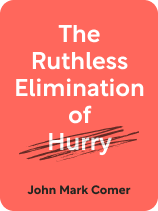

This article is an excerpt from the Shortform book guide to "The Ruthless Elimination of Hurry" by John Mark Comer. Shortform has the world's best summaries and analyses of books you should be reading.
Like this article? Sign up for a free trial here.
Are you ready to make some lifestyle changes? What could you do differently to get more out of life?
In The Ruthless Elimination of Hurry, John Mark Comer shares insights on what it means to rush through life, why we rush, and how doing so harms us and others. He provides practical advice on how to live a slower, more fulfilling life by following Jesus’s lifestyle.
The Ruthless Elimination of Hurry study guide below will help you apply the book’s principles to your life.
The Ruthless Elimination of Hurry Study Guide
You wake up, gulp down your coffee while speed-reading the news, and half-listen to a podcast during your rushed morning commute. You spend your workday juggling tasks before finally returning home and sinking into the couch, your brain fried and your heart pounding.
If any aspects of this scene describe your typical day, you know what it’s like to rush through life. In The Ruthless Elimination of Hurry, pastor and author John Mark Comer explores our cultural obsession with rushing and examines how it harms our relationships, health, sense of purpose, and spirituality. He argues that you can escape this culture of rushing by following the lifestyle of Jesus. He shares insights on how to stop rushing by deepening your Christian spiritual practice. By reading the book, you’ll learn how to carve out more time for your spiritual practice and enjoy slowing down your life.
Our The Ruthless Elimination of Hurry study guide below entails several questions that will help you get more out of the book.
Comer says that our rushed lifestyles harm our relationships, spirituality, health, and sense of purpose. Reflect on the extent to which your lifestyle is rushed and craft a plan to make your life more lively.
- In what ways is your lifestyle rushed? Recall that rushing is when you’re engaged in meaningless activities that distract you from meaningful ones. (For instance, perhaps you’re addicted to online shopping, which leaves you less time for meaningful activities such as spending time with family.)
- A rushed lifestyle can lead to the following perils: weak relationships, less spirituality, poor health, and the feeling that you lack a purpose. Which of these perils do you experience the most, and how does that peril show up in your life? (For example, perhaps you’ve been spending your Sunday mornings shopping online instead of going to church, and, as a result, you’ve lost some of your connection to God.)
- Consider the peril you wrote about above. Which solution appeals the most to you: slowing your daily tempo or honoring the Sabbath? What’s one step you could take to pursue that solution? (For instance, you could slow your daily tempo by gamifying the process of limiting your online shopping. Perhaps you could set yourself a weekly limit of 15 minutes of online shopping and challenge yourself to stick to that limit.)
- As you take steps to make your lifestyle less rushed and more lively, what types of opportunities might you have to say “no” to? (For example, perhaps you’ll need to forgo some tempting online sales.)

———End of Preview———
Like what you just read? Read the rest of the world's best book summary and analysis of John Mark Comer's "The Ruthless Elimination of Hurry" at Shortform.
Here's what you'll find in our full The Ruthless Elimination of Hurry summary:
- Our cultural obsession with rushing and how it's harmful in many ways
- How to stop rushing by deepening your Christian spiritual practice
- How to carve out more time for your spiritual practice






